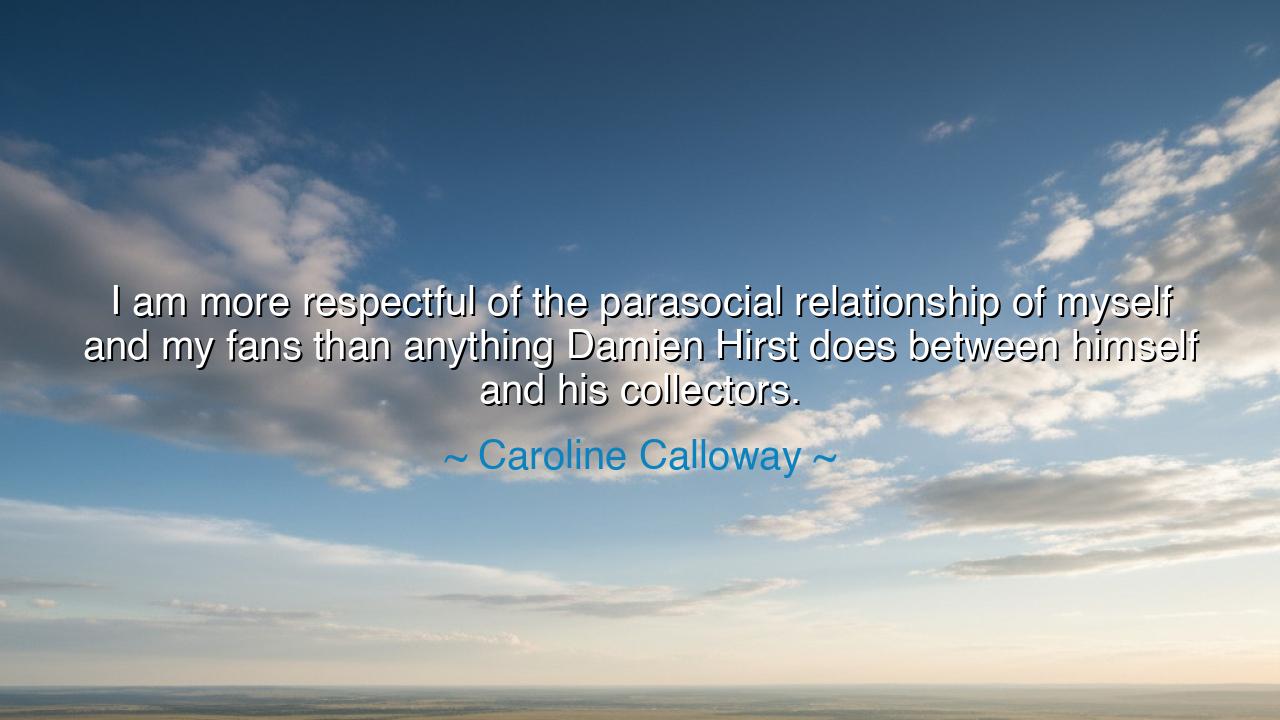
I am more respectful of the parasocial relationship of myself
I am more respectful of the parasocial relationship of myself and my fans than anything Damien Hirst does between himself and his collectors.






The writer and provocateur Caroline Calloway once declared with fierce conviction: “I am more respectful of the parasocial relationship of myself and my fans than anything Damien Hirst does between himself and his collectors.” In this sharp contrast she sets forth a challenge to the world of art and fame: what is the worth of a relationship if not built upon respect? She reminds us that even in the fragile realm of the parasocial, where intimacy flows one way, dignity must still be honored.
For the parasocial relationship is a modern mystery, born of distance yet filled with feeling. The fan, gazing upon the artist, believes themselves close though never truly embraced. Many treat this bond as hollow or exploit it for gain. Yet Calloway declares her reverence for it—that even these one-sided connections deserve care, for they are woven from trust, vulnerability, and longing.
In turning her words against Damien Hirst and his collectors, she strikes at the heart of commerce in art. Where Hirst’s exchanges may be bound by profit, transaction, and spectacle, Calloway exalts the invisible thread between herself and her audience. She claims that this thread, though intangible, is more sacred than the weight of gold or the price of canvas. It is not bought and sold, but lived in the quiet exchanges of attention, devotion, and response.
This is a radical truth: that respect does not require equality of standing, only sincerity of regard. Even if the fans may never truly know the one they adore, the artist can still honor their devotion by refusing to exploit it. To speak this aloud is to demand that fame itself be reshaped—not as a machine of consumption, but as a covenant of care.
So let this wisdom endure: whether in art, in fame, or in commerce, honor the unseen relationships that sustain you. For the bond between creator and audience, however lopsided, holds the power to shape lives and to heal hearts. And when treated with reverence, even the parasocial can reveal the sacred truth—that respect is the highest currency, and without it, all art and all connection are empty.






QHBanh Quang Hao
Caroline Calloway’s stance on the parasocial relationship with her fans versus Damien Hirst’s commercial interactions brings up an interesting debate. While she seems to value the emotional bond, is it possible for this kind of relationship to be sustainable in the long term without becoming exploitative? It also raises the issue of whether fans, in their desire for a personal connection, may sometimes blur the line between genuine affection and the expectations of being 'part' of a creator's life.
DKNgan Dang kim
I’m intrigued by Caroline Calloway’s view on parasocial relationships. It’s almost as if she’s drawing a line between authenticity and commodification. Hirst’s art dealings may be seen as purely transactional, while Calloway seems to place more value on the emotional engagement with her audience. It makes me wonder: how much responsibility do influencers and artists have to maintain authenticity while also managing their commercial success?
SSSans Star
This quote caught my attention because it highlights the complexity of how public figures interact with their fans versus their patrons. While Hirst’s relationship with his collectors is based on art sales, Calloway seems to value the emotional connection she shares with her fans. It makes me think—should public figures and creators prioritize emotional bonds over financial transactions, or is that unrealistic in today’s influencer-driven world?
HTHoa Tran
Caroline Calloway’s perspective on the parasocial relationship with her fans versus Damien Hirst’s relationship with collectors is quite thought-provoking. The concept of parasocial relationships has become more prevalent with social media, but it raises the question: when does it cross the line between admiration and exploitation? Are fans entitled to a certain level of transparency and respect, or is it all just part of the game of building a following?
HDLe Hai Dang
This quote made me reflect on the nature of parasocial relationships. It’s interesting that Caroline Calloway feels a sense of respect toward the bond she shares with her fans, as opposed to the transactional relationship between Damien Hirst and his collectors. In today’s digital age, where influencers and artists are so closely connected to their followers, do we blur the lines between genuine connection and commercial interests? Can parasocial relationships ever be truly reciprocal?